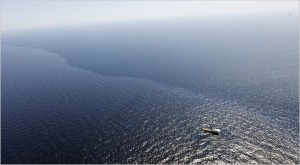 I arrived back in the U.S. still filled with elation from the World People’s Conference on Climate Change and the Rights of Mother Earth. Unfortunately, I was quickly reminded of the odds that we face in challenging the fossil fuel industrial complex.
I arrived back in the U.S. still filled with elation from the World People’s Conference on Climate Change and the Rights of Mother Earth. Unfortunately, I was quickly reminded of the odds that we face in challenging the fossil fuel industrial complex.
In the news as I flew back, in fact, was the story of a massive oil leak in the Gulf of Mexico. According to an article in the New York Times, at least 42,000 gallons of oil are leaking into the ocean from a ruptured pipeline 5,000 feet below the surface. This right on the heels of the disaster at the Upper Big Branch coal mine in West Virginia.
The article says that robots are working to seal off the leaking oil well, and quotes government officials who say that the oil spill does not appear to contain crude but only a “thin sheen of oil-water mix.” But this mix is 600 miles in circumference and, as the photo above shows, is clearly visible from the air. In addition, apparently planes (government?) are dropping chemicals that are toxic to marine life onto the spill in order to break it up.
 This spiral of toxicity seems typical of the way we behave in reaction to the environmental contradictions of contemporary capitalist society. We create a massive problem through our unsustainable exploitation of the planet and then we make things worse as we try to rectify the problem. As John McPhee brilliantly shows in his book The Control of Nature, we tend to view natural systems in linear, isolated, and mechanistic, when in fact they are complex, extended, and organic. The result is that our interventions to control nature always catalyze unforeseen complications.
This spiral of toxicity seems typical of the way we behave in reaction to the environmental contradictions of contemporary capitalist society. We create a massive problem through our unsustainable exploitation of the planet and then we make things worse as we try to rectify the problem. As John McPhee brilliantly shows in his book The Control of Nature, we tend to view natural systems in linear, isolated, and mechanistic, when in fact they are complex, extended, and organic. The result is that our interventions to control nature always catalyze unforeseen complications.
By the way, the banner ad above the Times article promotes “advanced deep sea technology” (i.e. oil rigs) for an unidentified interest called “EnergyTomorrow.org.” If you click on the banner, you get taken to a website that allows you to lobby Congress to “allow expanded access to oil and natural gas” resources. Talk about tone deafness!